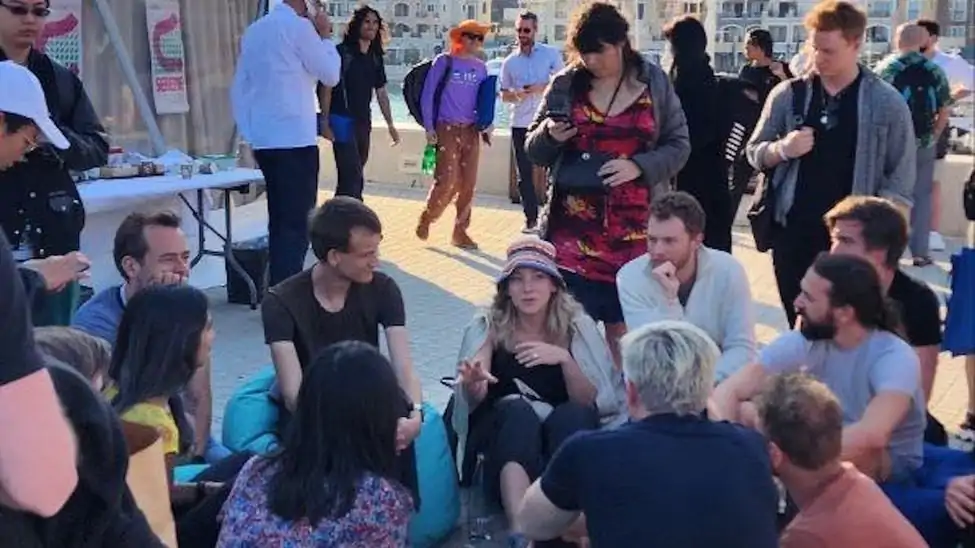What happens when you blend a crypto-conference with Burning Man and summer camp at a popular Mediterranean yachting port?
Zuzalu.
The first-of-a-kind event in Lustica Bay, Montenegro, taking place over the past two months, describes itself as a pop-up city, with an invite-only crowd of about 200 executives and developers focused on cryptography, technology and longevity. Another 300 invitees or so have popped in and out for days or weeks, long enough to absorb the vibe and maybe take part in the “cold plunges” in the Adriatic Sea that have become daily rituals.
A bonus, as chronicled extensively in the many selfies posted on Twitter by attendees, is the chance to get face time with arguably one of the most famous known inventors the crypto industry has produced to date: Ethereum co-founder Vitalik Buterin.
“You're living literally with Vitalik and see him daily,” said Milica Vulic, who is creating online courses on zero-knowledge proofs. “Today, he was running, and just ran right past me.”
Sharing meals with Buterin is what many participants talk about when reflecting on their time in the Balkan town. “Vitalik and I had dinner … He orders this huge fish, cooked whole, with, like, salad,” said Patri Friedman, general partner at Pronomos Capital, who stayed at Zuzalu for a month. “That was epic.”
Participants are put up in the Chedi, a five-star hotel overlooking the blue Lustica Bay, or, as the hotel says, a “luxury escape.” If the Chedi won’t do, participants have the choice to rent an Airbnb in the Montenegrin hills; some opt to stay on a yacht or catamaran at bay.
It’s not clear how exactly people get invited to Zuzalu. CoinDesk tried multiple times to be connected with two of the organizers, but we were ultimately unsuccessful, even after the message was conveyed at one point that there were concerns over how the event might be portrayed.
Attendees were less shy about publicizing their inclusion. Twitter was inundated with the posts of visitors from places including China, Nigeria, Spain and Serbia.
???>?Casually strollin' w/ Afropolitans, talking product roadmap, & we run into Vitalik who gives us some awesome advice!
Zuzalu has been ??.
Can't wait to share a ?? Twitter thread on the importance of access for our people ??? #Zuzalu#Montenegro@afropolitanpic.twitter.com/yk5vq6s1q0
— Eche Enziga ????? (@Echecrates) May 3, 2023
Tom Howard, a crypto entrepreneur, investor and one of the people behind the website network0 – “We are focused on building a future where everyone has the ‘option to exit’ to their own self-sovereign system,” the website reads – wrote on Twitter on May 11 that Zuzalu is a “community-led experiment and thus undefined.”
“As a visitor, I found a blend of co-living and intentional community concepts,” Howard wrote. “Many in the community are health conscious, and thus organized group workouts, hikes, cold plunges, saunas, healthy eating, mental health & more.”
In an undated video posted online, a speaker, seated on a beanbag chair next to Buterin, describes daily “rituals that are starting to develop here,” including the surprisingly popular “cold plunges” at 8 a.m. and 1 p.m.
Water temperatures in the bay average in the 60s Fahrenheit in April and May (high teens in Celsius), according to the website SeaTemperature.info.
Tim Beiko, protocol support lead at the Ethereum Foundation, who attended Zuzalu for two weeks during the blockchain's Shapella upgrade, told CoinDesk that he participated in the cold plunges “almost every day, unless I had a meeting or something.”
“Some days there were like three people,” he said. “Some days there's like 20 people.”
Many in the community are health conscious, and thus organized group workouts, hikes, cold plunges, saunas, healthy eating, mental health, & more.
There were community dinner nights where volunteers worked together to prepare a meal for 100s, making a large group more intimate. pic.twitter.com/re5dv5RnV9
— Tom Howard ???? Zuzalu ???? Tokyo (@_TomHoward) May 11, 2023
The agenda included official business-conference-style events, with many sessions taking place at the “Dome,” a structure built by volunteers specifically for the event, about 300 feet from the Chedi. Each week delved into a different theme, like zero-knowledge cryptography, and Web3, though other weeks were not crypto-specific, addressing themes like AI, network cities or longevity.
At night, the Dome hosted dance parties that turned into a club-like atmosphere. Friedman, who tore his ACL but didn’t want to miss out on the parties said, “I thought I wouldn't be able to dance. I love to dance and I was in a wheelchair.”
“But I actually just went crazy in the wheelchair and came up with wheelchair dances. It was super fun,” Friedman said.
The community-driven atmosphere meant that not everything revolved around the structure.
“Some days, there’s, like, organized stuff at the Dome, and some days, I don't know, someone's doing a cryptography tutorial in their apartment,” Beiko said.

Participants were encouraged to explore their own ideas and join in with “experiments” proposed by others, according to Hannah Hamilton, co-founder of Asymmetry Finance, which offers a digital token designed to give investors exposure to liquid staking derivatives.
“There's like continuous glucose monitors and people are testing what happens to their glucose levels,” Hamilton told CoinDesk in an interview.
She updated her Twitter profile with a photo of herself speaking animatedly in a discussion circle with fellow attendees, including Buterin, who appears to be listening intently. She said she stayed at Zuzalu for a month, and she dialed into Zoom meetings as part of her regular Asymmetry gig.
Buterin didn’t respond to an email from CoinDesk requesting an interview about the gathering.
What set Zuzalu apart from other conference-type events is that it didn’t feel like it was an actual conference, according to participants. “You sort of hang out with people in a bunch of different settings,” said Beiko.
How to score an invite for next year's Zuzalu is still ambiguous. Some participants noted that the organizers are trying to evaluate how they can invite more people, or maybe hold it in a different region in the world that makes it more accessible for travel.
Those lucky enough to make it this year spoke glowingly of the company.
Recommended for you:
- Digital Dollar Could Be Good for Financial Stability, US Federal Researchers Say
- U.S. Lawmakers Reintroduce Bill to Force Crypto Miners to Disclose Emissions
- Crypto Markets Analysis: Bitcoin and Ether’s Divergent 2023 Paths May Present Opportunity for Crypto Investors
“Every single person here believes they can change the world,” said Hamilton.
Edited by Bradley Keoun.



 BlocksInform
BlocksInform










